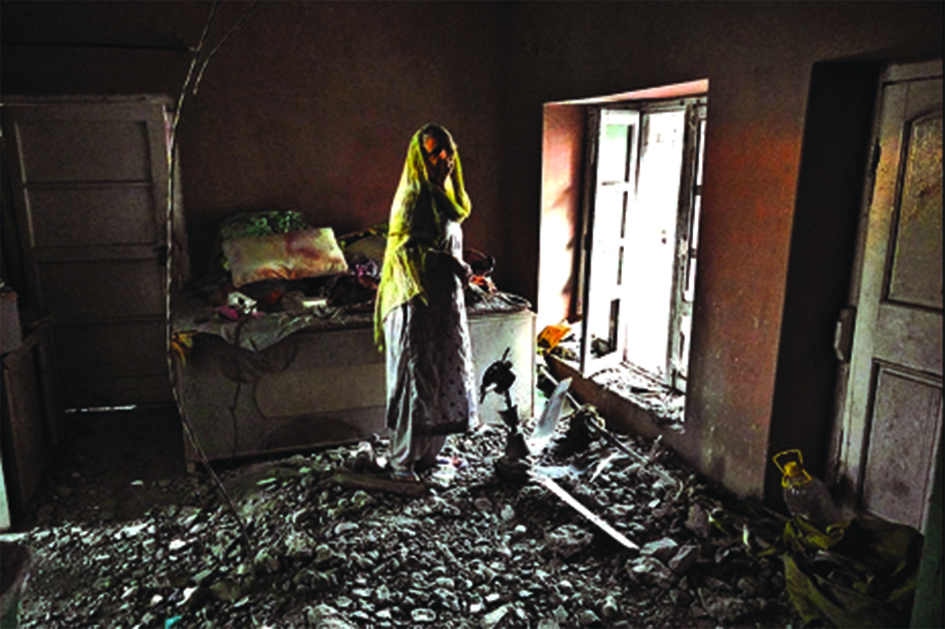| One month after Pak shelling, Poonch still struggles to heal | | |  Early Times Report Early Times Report
Jammu, June 7: Exactly a month has passed since the Pakistani Army unleashed a brutal artillery attack on Poonch, a border town in Jammu and Kashmir located along the Line of Control (LoC). The trauma still lingers. Fear remains etched on the faces of its residents—victims of an unprovoked assault that claimed the lives of innocent civilians and shattered the peace of a town known for its communal harmony.
The attack came in retaliation to India's targeted operations against terror infrastructure, but it was civilians—defenseless and unsuspecting—who bore the brunt. Poonch, once a symbol of brotherhood, now grapples with a deep emotional and psychological wound.
Addressing a rally on Friday after inaugurating the world’s highest railway bridge and flagging off the Vande Bharat train to the Kashmir Valley, Prime Minister Narendra Modi condemned Pakistan’s barbaric act in Poonch. A few days earlier, on May 30, Union Home Minister Amit Shah had visited the town to meet with families affected by the shelling.
In the pre-dawn hours of May 7, 2025, the Pakistani Army launched a sudden and intense artillery barrage on Poonch. The shelling struck residential areas, killing 14 unarmed civilians, including four children. Religious institutions—a gurdwara, a temple, and a madrasa—were also hit, making it clear that no one was spared in this indiscriminate attack.
Residents recall that horrifying morning with tearful eyes and trembling voices. Children were preparing for school, the elderly were out for their morning walks, and families had just begun their day—when the skies opened with fire. Shells rained down on homes, markets, and streets, leaving devastatio Fear remains etched on the faces of its residents—victims of an unprovoked Pakistan shelling.
The attack came in retaliation to India’s targeted operations against terror infrastructure, but it was civilians—defenseless and unsuspecting—who bore the brunt of Pak shelling in Poonch
Poonch , once a symbol of brotherhood, now grapples with a deep emotional and psychological wound.
In the pre-dawn hours of May 7, 2025, the Pakistani Army launched a sudden and intense artillery barrage on Poonch. The shelling struck residential areas..
A month later, life in Poonch has yet to return to normal. The trauma is fresh, the fear is real. Loud sounds at night trigger panic. Children are too scared to attend school, and parents are reluctant to let them venture outside. Markets wear a deserted look—shopkeepers say people only step out for essentials, and even then, they rush back home.
Locals say the danger still looms. Continued reports of border tension and sporadic firing add to the unease. Many families are considering relocating to safer areas, but poverty and livelihood constraints hold them back.
Locals are now demanding enhanced security arrangements, fair compensation, and proper rehabilitation for affected families.
While some relief efforts have begun, many say they are insufficient. Several families have not received financial aid, and those whose homes were destroyed continue to live in makeshift shelters.
The tragedy of Poonch goes far beyond the 14 lives lost. It is a story of a community gripped by fear, haunted by uncertainty, and crying out for peace. It is the silent suffering of a town that wakes each day unsure of what lies ahead.
The people of Poonch still look for hope—for assurance that their pain is acknowledged, their safety prioritized, and their children’s futures protected. But unless lasting peace is restored and real measures are taken, the wounds of Poonch will not heal.
May 7 stands as a black chapter in Poonch’s history. Yet amid the sorrow, the strength of its people endures. They continue to live under the shadow of fear, but refuse to surrender. |
|
